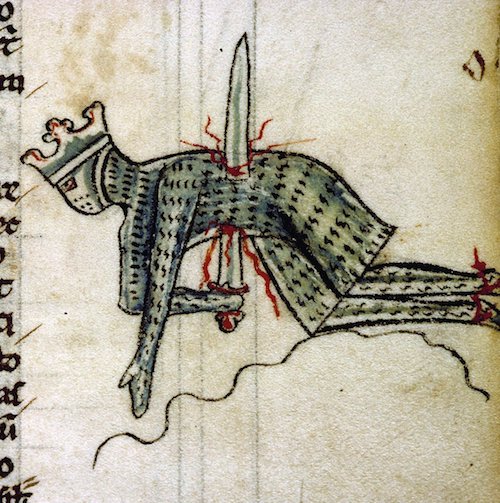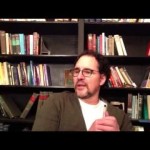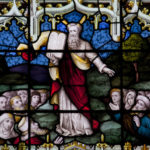We run our website the way we wished the whole internet worked: we provide high quality original content with no ads. We are funded solely by your direct support. Please consider supporting this project.

God’s Non-Violent Ideal in the OT
While God condescended to working within the violent-prone, fallen framework of his people in the Old Testament—as I argue in Crucifixion of the Warrior God—the OT is also full of references to how God worked to preserve his non-violent ideal as much as possible. He did this by continually reminding his people not to place any trust in the sword, but to rather place all their trust him.
For example, as Judah was facing impending doom, the Lord told Hosea that he would save them “not by bow, sword or battle, or by horses and horsemen, but I the LORD their God will save them” (Hos 1:7).
So too, through the Psalmist the Lord encourages his people by saying:
Do not put your trust in princes,
in human beings, who cannot save.
When their spirit departs, they return to the ground;
on that very day their plans come to nothing.
Blessed are those whose help is the God of Jacob,
whose hope is in the LORD their God (Ps. 146:3-5).
Along these same lines, it was undoubtedly to buttress his people’s trust in him rather than the sword that the Lord instructed his people ahead of time that, if and when they rebelliously decide to have a king, they should not allow him to amass a large army (Deut. 17:16). For while “[s]ome trust in chariots and some in horses,” Israelites were to “trust in the name of the LORD our God” (Ps. 20:7).
Despite all appearances to the contrary, the Psalmist is convinced that “[n]o king is saved by the size of his army” and “no warrior escapes by his great strength.” Yet, “the eyes of the LORD are on those who fear him” and whose “hope is in his unfailing love” to “deliver them from death” (Ps. 33:16-19). Because he trusts in the Lord, another writer confesses, “I put no trust in my bow, my sword does not bring me victory” (Ps. 44:6). And despite his sinful proclivity to trust in armies, even David was, at least at one point, confident that “it is not by sword or spear that the LORD saves” (I Sam. 17:47).
While the Lord frequently promised to bless those who trusted in him, he also frequently pronounced woe on all who instead chose to find their security in the sword. Hence, for example, to the Israelites who were seeking protection from Assyria by forging military alliances with Egypt, the Lord declared:
Woe to those who go down to Egypt for help,
who rely on horses,
who trust in the multitude of their chariots
and in the great strength of their horsemen,
but do not look to the Holy One of Israel,
or seek help from the LORD (Isa 31:1).
Similarly, through Hosea the Lord tells his people that they “have planted wickedness” and “have eaten the fruit of deception” because “you have depended on your own strength and on your many warriors.” For this reason, he says, “your fortresses will be devastated” and “mothers” will be “dashed to the ground with their children” (Hos. 10:13-14). The passage clearly reflects God’s accommodation to Hosea’s interpretation of how this will happen, for Hosea depicts God being directly behind this atrocity. Yet, the passage nevertheless bears witness to God’s true desire for his people to place no trust in military might.
Along these lines, David was punished precisely because he gave into Satan’s temptation to calculate how much military power he had (1 Chron. 21). It’s also interesting to note that, despite the fact that Yahweh is frequently depicted as helping David successfully wage war against the Philistines and other threatening nations, he nevertheless refused to allow David to build his temple because, he said, “you are a warrior” who has “shed much blood on the earth in my sight” (I Chron. 22:8; 28:3).
Given that the temple was regarded as the place where God uniquely dwelt, this prohibition bears witness to the fact that, while the incarnational God was not above condescending to wear the mask of a violent ANE warrior deity as he furthered his sovereign purposes through David, this is not where he actually lives. His true tabernacle, manifested perfectly in Jesus Christ in whom he fully dwelt (Jn 1:14), is rather characterized by self-sacrificial love and the shunning of all violence.
Image: Suicide of Saul, Bible, England 13th century (Angers, Bibliothèque municipale, ms. 9, fol. 62r)
Category: General
Tags: Cruciform Theology, Nationalism, Non-Violence
Topics: Enemy-Loving Non-Violence
Related Reading

Podcast: What is Violence?
Greg takes a closer look at what violence is. Then he bullies Dan. http://traffic.libsyn.com/askgregboyd/Episode_0174.mp3

The Rorschach Test
The choices we make will either increase or decrease our ability to recognize light when we see it. As we choose goodness, we increase our capacity for goodness. What do you see when you read the Bible or look at God or interact with others? Everything is a Rorschach test to some extent, revealing the light…

Cruciform Theology in Four Steps
The culmination of the biblical narrative of the cross reframes everything about who God is, what it means to have faith in God, and how we read the Bible! The entire Old Testament leading up to the crucified Christ must be interpreted with a view toward discerning how it anticipates and points toward this definitive…

Did God Give Violent Laws? A Response to Paul Copan (#13)
In his critique of Crucifixion of the Warrior God (CWG) at the Evangelical Theological Society annual meeting in November, Paul Copan takes issue with my contention that the violent dimension of OT laws reflects God accommodating the fallen and culturally conditioned perspectives of his people at this time. In my view, God was stooping to…

When God is Revealed
Whether we’re talking about our relationship with God or with other people, the quality of our relationships can never go beyond the level of trust the relating parties have in each other’s character. We cannot be rightly related to God, therefore, except insofar as we embrace a trustworthy picture of him. To the extent that…

